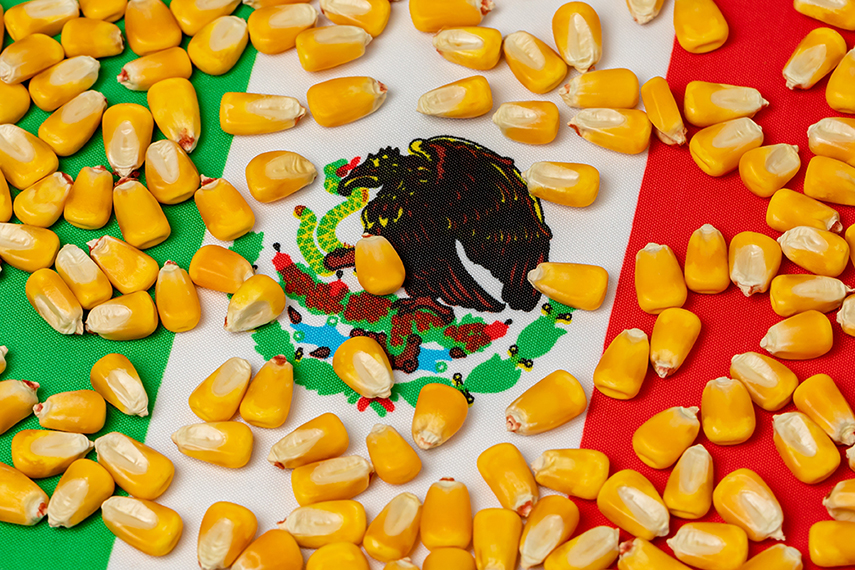High Levels of Genetically Engineered Toxins and Glyphosate in GMO Corn Pose Serious Health Risks in Mexico
By: Charles Benbrook, PhD and Kendra Klein, PhD
A trade dispute between Mexico and the U.S. over genetically engineered (GMO) corn is pitting science against the power of the pesticide industry. On both sides of the border, and perhaps worldwide, this dispute promises to focus a new generation of eaters, public health scientists, and political leaders on what is known, and not known, about the safety of food made from GMO corn.
Mexico is seeking to make a bold move — prohibiting the use of GMO corn in tortillas and other traditional corn-based foods. In response, the U.S. government has taken Mexico to court under the U.S.-Mexico-Canada Free Trade Agreement (USMCA). For the U.S., this is primarily a symbolic fight, as less than one percent of U.S. corn exports to Mexico are under question. The U.S. is by far the world’s most dedicated proponent of GMO crops and the pesticides that go along with them. Decades of evidence show deep collusion between the U.S. government and pesticide corporations like Bayer-Monsanto that develop and profit from GMO corn.
While the Mexican government issued a 189-page report detailing the scientific basis for the ban, the U.S. submission to the USMCA dispute resolution tribunal is long on proclamations and short on facts.
Last week, technical comments that we co-authored for Friends of the Earth U.S. were posted by the tribunal. Our comments support Mexico’s extensive presentation of the science and reject the U.S.’s grossly inadequate safety assessments.
Our comments highlight that U.S. approval of GMO corn is largely based on industry assertions, not science. Shockingly, reproductive, developmental, neurological, metabolic, microbiome, or GI tract-related health risks haven’t been addressed in a meaningful way by the U.S. Food and Drug Administration, or via any other process in the public or private sector.
That’s worrisome given the fact that the toxicity of GMO corn has been increasing in two ways.
First, take the insecticidal toxins that have been engineered into every grain of GMO corn. Early varieties had just one, but today, two thirds of GMO corn varieties have been engineered to have three or more. Levels of these toxins in GMO corn grain now measure 50—100 parts per million (ppm), up from 2—6 ppm, the average when very limited GMO corn food safety studies were carried out up to 30 years ago. These levels exceed maximum food tolerances for widely used corn insecticides by 40- to 2,000-fold.
Second, consider the herbicides that are integral to GMO corn. Originally, GMO corn was engineered to withstand the weedkiller glyphosate (aka Roundup) — a chemical that would otherwise kill the crop along with weeds. The use of this cancer-linked chemical has increased in the U.S. over 10-fold since the introduction of GMO crops. Today, 86 percent of GMO corn varieties are engineered to withstand two to four toxic herbicides.
Together, these trends have driven up the number of toxins and pesticides used on the average hectare of GMO corn four-fold since the 1990s when GMO corn was first introduced.
The scientific evidence on glyphosate-based herbicides is damning. They are linked to increased risk of blood cancers, including non-Hodgkin lymphoma and leukemia, metabolic syndrome, kidney and liver disease, preterm birth, neurodevelopmental problems, and disruption of the bacterial microbiome in humans and other mammals.
While much of the focus on the health harms of GMO corn rightfully centers on glyphosate, emerging evidence on the genetically engineered insecticidal toxins the corn contains is also concerning. Data show the potential for risk of adverse impacts on the human microbiome and GI tract, and risks of allergenicity stimulating an immune system response “as potent as that elicited by cholera toxin.”
There is no science evaluating the consequences of people’s exposure to the toxic cocktail that comes along with GMO corn — exposure to multiple genetically engineered toxins along with residues of glyphosate and other harmful herbicides. This is a massive scientific gap in our ability to accurately assess the human health risks of GMO corn.
What’s more, any health risks are likely to be amplified in Mexico, as corn is the caloric backbone of its food supply, averaging 50 percent or more of the calories in the Mexican diet. In fact, Mexicans eat ten times more corn than Americans.
The Mexican government is both wise and on solid ground in refusing to allow its people to participate in the experiment that the U.S. government — in cahoots with the corporations profiting from GMO corn — seeks to impose on Mexico.
Charles Benbrook, PhD is a researcher on pesticides and agricultural biotechnology
Kendra Klein, PhD is Deputy Director of Science at Friends of the Earth U.S.





